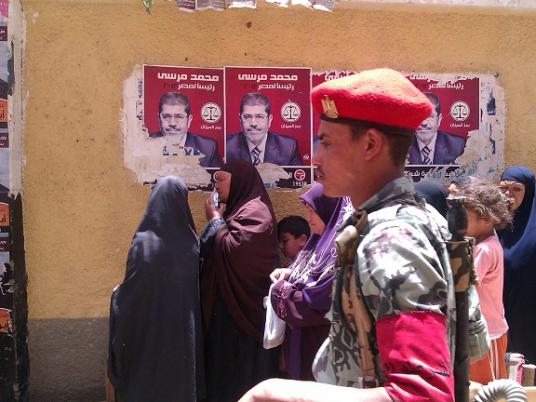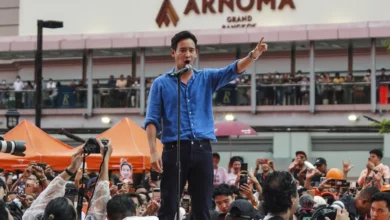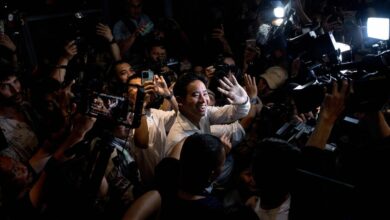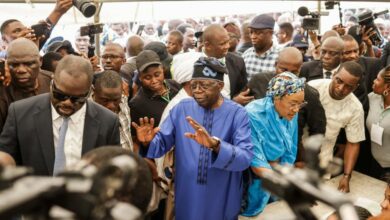
The first day of the presidential election dominates today’s news, with images giving just as much of a sense of a paper’s political leaning as its written text. The coverage is mostly positive, and the ballot box is being associated with the future of a free Egypt and a reminder that this wouldn’t have been possible without the revolution's martyrs.
State-owned Al-Ahram predictably has stereotypical images running throughout the paper: an army officer helping an old lady up a step (front page); a Muslim woman offering a seat to Christian nuns standing in the voting queue; a young boy smiling at army officers; an army lieutenant maintaining orderly voting lines; and a young boy dressed as an army lieutenant holding his father’s hand in the queue. The message: The army is in the service of the nation, Muslims and Christians live in harmony, and the army has broad support even among the youth.
In contrast, privately owned Al-Shorouk has more provocative images. On page three, men stand in line in downtown Cairo to vote in front of a wall built by the Interior Ministry to shield itself after February clashes between police and protesters that resulted in many deaths. On the same page, there is a photograph of graffiti on one of the downtown walls, showing a face split in two between the ruling military junta’s Hussein Tantawi and deposed President Hosni Mubarak. The picture had been painted over a few days ago, but then was repainted the day after with the addition of presidential candidates Amr Moussa and Ahmed Shafiq — both considered by revolutionaries to be remnants of the Mubarak regime. The message: The revolution continues beyond the ballot box.
The Freedom and Justice newspaper, owned by the Muslim Brotherhood-affiliated political party of the same name, mainly shows images of Muslim men, veiled and niqab-wearing women, and the army assisting these women. The only time it makes reference to Christians is on the back page in a caricature, in which two men stand next to each other in prayer. A speech bubble reads “God … let Egypt succeed … Amen.” In the background are three sites of worship: two mosques and one church.
Left-leaning and privately owned Al-Tahrir is the only paper to run images of martyrs on its front page, which also includes the images all papers are running of long voting queues and presidential candidates casting their ballots.
In the title of his Al-Shorouk column, Fahmy Howeidy reminds us that the election was an “Appointment set by the martyrs.” He refers to the aftermath of last November’s Mohamed Mahmoud Street clashes between police and protesters that resulted in more than 40 deaths and 3,000 injured. Five days after the clashes ended, Tantawi announced for the first time that the presidential election would take place in June 2012 and that the military would hand over power to a civilian government by the end of that month — prior to that the expected handover date was 2013. The date for the first round of the presidential race was then set for 23 and 24 May.
Most papers send a positive message about the voting experience, though most also make reference to the violations that reportedly took place throughout the day, including presidential candidates who continued to campaign in defiance of election regulations.
Al-Ahram’s front page headline reads: “The people recover their free will,” presumably in reference to the fact that voting in previous years was a predetermined process. Despite the lack of official exit polls, it goes on to report a large voter turnout in the country’s 13,000 polling centers in 99 voting districts. Its main story quotes the presidential candidates affirming that they will accept the outcome of the election, providing that there is no evidence of rigging.
Interior Minister Mohamed Ibrahim has said that there was a 40 percent voter turnout in governorates such as Daqahlia and Sharqiya, and 24 percent in other areas.
Head of the Presidential Elections Commission Hatem Bagato is also cited by Al-Ahram praising judges and the army for their part in the process.
Freedom and Justice provides detailed coverage of voting across the country’s governorates with a story from Monufiya about alleged LE100-vote buying by “feloul” (a derogatory term that refers to remnants of the Mubarak regime).
Independent Al-Dostour takes a strong anti-Brotherhood and anti-religious party line on its front page. Headlines read: “Preliminary indicators confirm a retreat of the religious movement;” “The niqab is the weapon of the Brotherhood fraud;” “The scandals of public fraud by the Brotherhood.” The paper alleges that the Brotherhood and its Freedom and Justice Party used women wearing niqabs to stand in the voting queue after they had cast their votes to slow down other voters, among other supposed stalling tactics.
Al-Shorouk takes a more balanced approach to with headlines that read: “A president ordered by the people” and “The future of Egypt in the queues of freedom.” It also mentions the minor violations throughout the day with regard to people’s national ID numbers and judges arriving late to open the polling stations.
Similarly positive is Al-Tahrir: “Turnout without overcrowding … voting without hustle … violations without danger.” And state-run Al-Akhbar leads with: “We realized the dream.”
Egypt's papers:
Al-Ahram: Daily, state-run, largest distribution in Egypt
Al-Akhbar: Daily, state-run, second to Al-Ahram in institutional size
Al-Gomhurriya: Daily, state-run
Rose al-Youssef: Daily, state-run
Al-Dostour: Daily, privately owned
Al-Shorouk: Daily, privately owned
Al-Watan: Daily, privately owned
Al-Wafd: Daily, published by the liberal Wafd Party
Youm7: Daily, privately owned
Al-Tahrir: Daily, privately owned
Freedom and Justice: Daily, published by the Muslim Brotherhood's Freedom and Justice Party
Sawt al-Umma: Weekly, privately owned
Al-Arabi: Weekly, published by the Nasserist Party
Al-Nour: Official paper of the Salafi Nour Party




